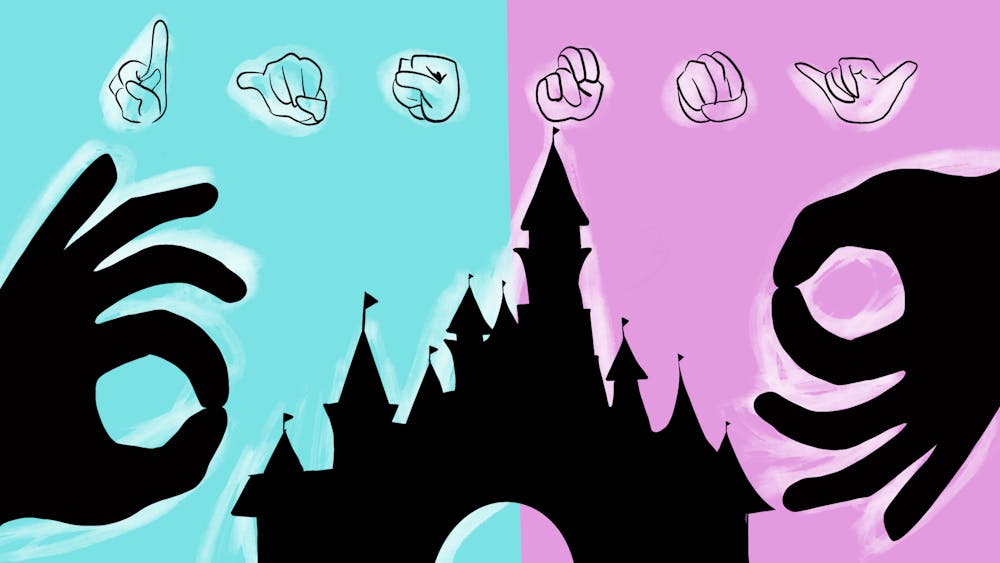When I first speak with Mariella Satow, I have to bite my tongue to keep from interrupting her with stories about my 7–year–old sister, whom I will inevitably boast about before we sign off. In the background, the 2022 Oscars gear up: A few hours from now, Troy Kotsur will become the first deaf man to win an acting Oscar, and CODA will win Best Picture in a ceremony overshadowed by controversy.
A few days earlier, my sister is admitted to the hospital for an infection that prevents her from wearing her cochlear implant. From FaceTime calls, I glean that the room is stark, white, and isolated. The only color emits from the TV that plays Disney movies, and my heart sinks a little deeper. A 7–year–old can’t read a movie’s worth of captions whether they’re offered or not. I hate that one of the only sources of comfort in her vicinity is inaccessible to her. When I discover Mariella’s app on a friend’s Instagram story, my heart hurts a little less.
Though we have made strides in the accessibility of the theater experience, there’s still a long way to go. Every showing of CODA in theaters featured open captions, text that is always in view; yet for other movies such as Eternals, which features Lauren Ridloff as the Marvel Cinematic Universe’s first deaf superhero, open caption screenings were few and far between in many areas. Though closed captions for the film were available via cup holder units or glasses that project captions in every state, these can be uncomfortable, inconvenient, and isolating for deaf moviegoers. On the other hand, open caption viewings that are available tend to be at odd hours—either late at night or during the workday. For decades, deaf viewers have been an afterthought in Hollywood. In many ways, they continue to be so, especially for those who prefer interpretation to captions. Luckily, CODA’s pivotal awards season success ensures that deaf accessibility is at the forefront of the conversation.
At the height of the COVID–19 pandemic, Mariella began to learn American Sign Language (ASL), inspired by an interaction she had with a deaf man in a supermarket years earlier. Searching for movies with ASL captions to help facilitate the learning process, she found a distinct lack of them. After speaking with hearing parents of deaf kids, polling the Deaf community in Facebook groups, and researching statistics, she discovered that many others shared her desire. She decided to start SignUp, a Google Chrome extension that adds ASL captions to Disney+ content, which launched in August 2021.
SignUp should not be revolutionary, yet it is. Mariella recognizes that closed captions are not a substitute, especially for deaf children who face reading delays. As she puts it: “Closed captions are undescriptive. Some of the time they’re inaccurate or they’re missing from certain streaming platforms or networks. They also don’t convey the emotion and expression that sign language does.” We often forget that ASL is a language with the same linguistic properties as a spoken language: It’s dynamic, developed, and dialects exist. Defaulting to closed captions undermines this.
Starting SignUp was not an effortless venture, especially against a strained budget. “I funded it myself, and I’m a dog walker. So that’s obviously not big money,” she says. “[I had to] find interpreters who were willing to work for a slightly reduced rate,” she continues. Though she reports that these struggles have since plateaued due to the generosity of donors, it points to the difficulty in starting such a simple yet important project—one that Mariella tells me parents of deaf children have asked for from streaming platforms for years.
Preparing to expand to Netflix, Amazon Prime Video, PBS, and Hulu in the near future, Mariella articulates her long–term goals for the medium: “[I want to] get every movie interpreted that people ask for, which is massive, because, as you know, we’re quite behind. The interpretation should have been happening as the movies were coming out. So we’re catching up,” she says. “And I mentioned the … platforms we’re launching on this year, but I’d love to have all 300 sign languages, which will take a while.” Her goals may seem ambitious, but they should be; after all, this is long overdue.
As our conversation dwindles, Mariella’s eyes gleam as she describes who got SignUp to where it is today: the Deaf community. In particular, she speaks fondly of the first interpreter she hired: “Mikaela has been amazing. I mean, it was just her interpreting movies for the first four months.” She tells me that what she enjoys most is “when parents or teachers email [her] and give their comments, and especially when there are adorable photos of their kid watching a movie and understanding it for the first time.” One parent, Jessica S., wrote, “My Deaf daughter is 11 and I have written emails frequently to movie producers (Disney, Blue Sky, etc.) begging for this! I'm so glad something has come along while she is still a child and can benefit!”
My sister is seven years old, but she’s the strongest, smartest, and bravest person I’ve ever met. SignUp was made with her in mind, and I feel an obligation to share it. That said, ASL captions should have been commonplace long before SignUp was launched in 2021. As Deaf representation continues to rise in mainstream media, it’s important that we remember those it is meant to serve. Open captions in movie theaters and ASL captions on streaming services are features that should be expected, not commended, and I’m disappointed that Mariella had to take the lead on the latter. Nevertheless, I’m grateful that she did, and I'm excited to use it with my sister.

